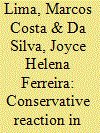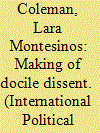| Srl | Item |
| 1 |
ID:
146715


|
|
|
|
|
| Contents |
This paper dissects the current global economic crisis and its causes and consequences in the Americas and Europe. It notes that from the beginning of the present century onwards, the left wing governments that were elected in much of South America improved the lot of the poorest sections of society but did not curb the power of the entrenched business elites and landowning oligarchies in a context of economic decline and malaise. The dysfunctional democratic system of Brazil and the influence of the reactionary upper classes served by the media and supported by neoconservative Pentecostal evangelist churches, led to the overthrow of President Dilma Rousseff in a soft coup aiming to restore fiscal austerity and liberal economic policies.
|
|
|
|
|
|
|
|
|
|
|
|
|
|
|
|
| 2 |
ID:
124455


|
|
|
|
|
| Publication |
2013.
|
| Summary/Abstract |
This study is about strategies of neoliberalization in relation to practices of dissent and resistance. It explores how struggles arising in the context of neoliberalization may be subject to entanglement within the very processes they seek to contest and-in so doing-interrogates the political stakes of neoliberal governmental rationality. Drawing upon extensive ethnographic research, I trace the international trajectory of mobilizations against the dispossession visited upon Colombian farmers in the context of BP's investment in oilfields in the mid-1990s. Reasoning through attention to the ways in which this one specific struggle was neutralized, I suggest that a key aim of neoliberal strategies of political control is to accomplish a sort of "political hygiene" by nullifying politically surplus subjects and containing dissent within manageable parameters. The invocation of discourses of rights and civil society can be seen to be integral to neoliberal political rationality in this regard, but rights are comprehended within a symbolic structuration of the population that coincides with neoliberal logics. I suggest that such logics are directed not so much at incorporating the population into a generalized "right of death and power over life," as Foucault famously put it, but at inscribing subjects into networks of unstable and precarious private contract that constrict the wider obligations of population and citizenship commonly associated with liberalism. Discourses of rights, civil society, and development are not antidotes to socioeconomic dispossession or armed repression. Rather, all of these are complementary components of strategies aimed at the domestification of dissent.
|
|
|
|
|
|
|
|
|
|
|
|
|
|
|
|